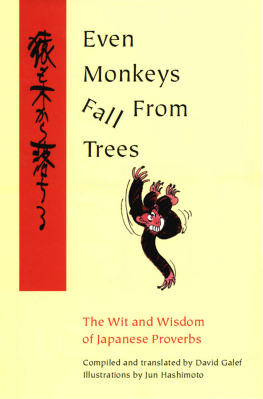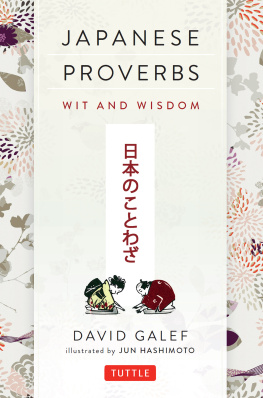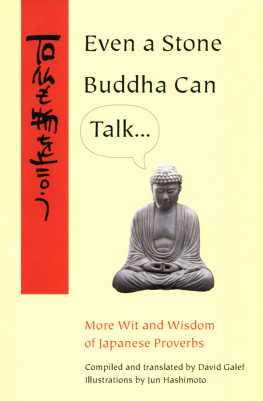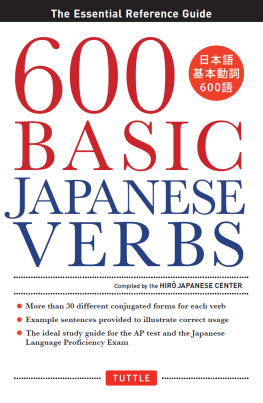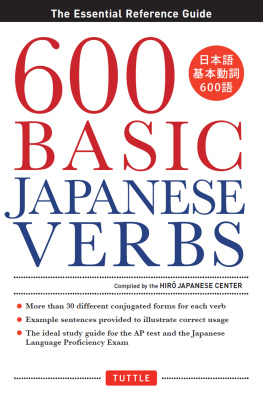David Galef - Even Monkeys Fall from Trees: The Wit and Wisdom of Japanese Proverbs
Here you can read online David Galef - Even Monkeys Fall from Trees: The Wit and Wisdom of Japanese Proverbs full text of the book (entire story) in english for free. Download pdf and epub, get meaning, cover and reviews about this ebook. year: 2015, publisher: Tuttle Publishing, genre: Art. Description of the work, (preface) as well as reviews are available. Best literature library LitArk.com created for fans of good reading and offers a wide selection of genres:
Romance novel
Science fiction
Adventure
Detective
Science
History
Home and family
Prose
Art
Politics
Computer
Non-fiction
Religion
Business
Children
Humor
Choose a favorite category and find really read worthwhile books. Enjoy immersion in the world of imagination, feel the emotions of the characters or learn something new for yourself, make an fascinating discovery.
- Book:Even Monkeys Fall from Trees: The Wit and Wisdom of Japanese Proverbs
- Author:
- Publisher:Tuttle Publishing
- Genre:
- Year:2015
- Rating:5 / 5
- Favourites:Add to favourites
- Your mark:
- 100
- 1
- 2
- 3
- 4
- 5
Even Monkeys Fall from Trees: The Wit and Wisdom of Japanese Proverbs: summary, description and annotation
We offer to read an annotation, description, summary or preface (depends on what the author of the book "Even Monkeys Fall from Trees: The Wit and Wisdom of Japanese Proverbs" wrote himself). If you haven't found the necessary information about the book — write in the comments, we will try to find it.
Even Monkeys Fall from Trees: The Wit and Wisdom of Japanese Proverbs — read online for free the complete book (whole text) full work
Below is the text of the book, divided by pages. System saving the place of the last page read, allows you to conveniently read the book "Even Monkeys Fall from Trees: The Wit and Wisdom of Japanese Proverbs" online for free, without having to search again every time where you left off. Put a bookmark, and you can go to the page where you finished reading at any time.
Font size:
Interval:
Bookmark:
LCC No.: 87050166 ISBN-10: 0-8048-3226-9 ISBN-13: 978-0-8048-3226-7 ISBN: 978-1-4629-0318-4 (ebook) Distributed by North America, Latin America & Europe Tuttle Publishing 364 Innovation Drive, North Clarendon, VT 05759-9436 U.S.A. Tel: 1 (802) 773-8930; Fax: 1 (802) 773-6993 www.tuttlepublishing.com Japan Tuttle Publishing Yaekari Building, 3rd Floor 5-4-12 Osaki, Shinagawa-ku, Tokyo 141-0032 Tel: (81) 3 5437-0171; Fax: (81) 3 5437-0755 Asia Pacific Berkeley Books Pte. Ltd. 61 Tai Seng Avenue, #02-12Singapore 534167 Tel: (65) 6280-1330; Fax: (65) 6280-6290 www.periplus.com 11 10 09 08 07 16 15 14 13 12 Printed in Singapore TUTTLE PUBLISHING is a registered trademark of Tuttle Publishing, a division of Periplus Editions (HK) Ltd. 
by Edward G. Seidensticker The primary definition of proverb in the Oxford English Dictionary is very careful: 11 A short pithy saying in common and recognized use; a concise sentence, often metaphorical or alliterative in form, which is held to express some truth ascertained by experience or observation and familiar to all; an adage, a wise saw.
The three words before express follow the advice of Atama kakushite shiri kakusazu (English equivalent Protect yourself at all points): foresee challenges and attacks and take measure against them. If the Oxford did as the small desk dictionaries I have with me do, and dispensed with the qualification, then the definition would be in error. Sometimes proverbs fly in the face of experience or observation, and sometimes a proverb will contradict another one. Ky no yume, saka no yume (no. 50) is vague and subject to several interpretations, some not completely in accord with common sense. 88), urging us to trespass upon a tigresss den. 88), urging us to trespass upon a tigresss den.
Proverbs are what people are always saying. In this they are akin to cliches, but they are different from cliches in that they have a touch of poetry. They make lively use of imagery and they are sensitive to the music of language. They say the things that people think important in ways that people remember. They express common concerns. So a collection of proverbs is a compact treatise on the values of culture.
Matching sets of proverbs from two cultures make a treatise in comparative sociology, or cultural anthropology. It need not surprise us, though it should interest us, that the same proverbs are to be found in very different cultures. The lot of the human race is similar the world over. That not all the proverbs of one culture are to be found in another need not surprise us either, and it should interest us very much. It demonstrates that the concerns of the two are not identical. It ought to shake us a little from our parochialism.
Inevitably, Mr. Galef does not always find perfect English matches for his Japanese proverbs. Some of his equivalents do not sound like proverbs, and some do not seem precisely equivalent. He makes note in his Preface of an excellent example, the one about the nail that sticks out (no. 43). Dont make waves is ingenious, but it seems more an injunction to moderation than to conformity.
The heart of the matter is that Americans, for example, are not exhorted by their proverbs to conform as Japanese are, so the quest for a perfect equivalent is probably doomed from the outset. It would be hard to find Japanese equivalents for some of the more puritanical of Anglo-American proverbs (Spare the rod and spoil the child), and Mr. Galef has perhaps not been entirely successful in finding an English equivalent for a very Buddhist one, Ko wa sangai no kubikase (no. 76), also about children. I do not mean to reprove him. Hashimoto. Hashimoto.
These little frustrations are, as I have said, inevitable, and they make the book more interesting. It is a likeable book, and it tells us much about Japan.
List of Proverbswith English Equivalents Mago ni mo ish. Clothes make the man. Hiza tomo dang. Two heads are better than one.
Saru mo ki kara ochiru. Anybody can make a mistake. Konya no shiro-bakama. Shoemakers children go barefoot. Sen-ri no michi mo ippo kara. You have to start somewhere.
Kani wa kora ni nisete ana o horu. Cut your coat according to your cloth. Jinsei wa fzen no tomoshibi. Our life is but a span. Ja no michi wa hebi. Set a thief to catch a thief.
Itadaku mono wo natsu de mo kosode. Dont look a gift horse in the mouth. Dby ai-awaremu. Misery loves company. Hotoke no kao mo san-do. lchi-mon oshimi no hyoku-zon. lchi-mon oshimi no hyoku-zon.
Penny-wise, pound-foolish. Akuji sen-ri o hashiru. Bad news travels fast. Go ni itte wo g ni shitagae. When in Rome, do as the Romans. Hatake kara hamaguri wa torenu.
You cant get blood from a stone. Send ku shite fune yama ni noboru. Too many cooks spoil the broth. Ura ni wo ura ga aru. There are wheels within wheels. Tagei wo mugei.
Jack of all trades, master of none. Kuchi wa wazawai no moto. The mouth is the gate of evil. Rakka eda ni kaerazu, haky futatabi terasazu. Theres no use crying over spilt milk. Oni no nyb kijin ga naru.
The apprentice outstrips the master. Tamago to chikai wa kudake-yasui. Actions speak louder than words. Ippai wa hito sake o nomi, ni-hai wa sake sake o nomi, sam-bai wa sake hito o nomu. Wine is a mocker; strong drink is raging. Miso no miso-kusai j-miso ni arazu.
All that glitters is not gold. Issun no mushi ni mo go-bu no tamashii. Everything has its place. Ke-bukai mono wa iro-bukai. Bald and barren. Mochi wa mochiya.
The right man for the right job Toranu tanuki no kawa-zany Dont count your chickens before theyre hatched. Naku ko to jit ni wa katenu. You cant fight City Hall. lnu mo arukeba b ni ataru. Never go looking for trouble. or Seek and ye shall find.
Hana yori dango. Pudding before praise. Chiri mo tsumoreba yama to naru. Great oaks from little acorns grow. Nakittsura ni hachi. Adding insult to injury.
Muri ga trebo dri hikkomu. Might makes right. Kusai mono ni futa. Dont wash dirty linen in public. Bimb hima nashi. There is no rest for the weary.
Se ni hara wa kaerarenu. Self-preservation is the first law of nature. Yabu o tsutsuite hebi o dasu. Let sleeping dogs lie. Shitashiki naka ni mo reigi ari. lnu no kenka ni kodomo ga ae, kodomo no kenka ni oya go deru. lnu no kenka ni kodomo ga ae, kodomo no kenka ni oya go deru.
One thing leads to another. E ni kaita mochi wa kuenu. Never confuse art with life. Kaeru no ko wa kaeru. Like father, like son. Deru kugi wa utareru.
Dont make waves. Baka mo ichi-gei. Even a broken clock is right twice a day. Makeru go kachi. The race is not to the swift. J-nin to-iro.
There is no accounting for tastes. Saru mono wa hibi ni utoshi. Out of sight, out of mind. Jishin, kaminari, kaji, oyaji. Fear those greater than yourself. Tsume no aka o senjite nomu.
Follow in someones footsteps. Ky no yume, saka no yume. Wishing will make it so. Tabi wa michizure, yo wa nasake. A friend in need is a friend indeed. He o hitte shiri tsubome.
No use shutting the barn door after the horse bolted. Yoshi no zui kara tenj o miru. You cant see the forest for the trees. Mitsugo no tamashii hyaku made. The child is the father of the man. Monzen no koz narawanu ky o yomu.
Font size:
Interval:
Bookmark:
Similar books «Even Monkeys Fall from Trees: The Wit and Wisdom of Japanese Proverbs»
Look at similar books to Even Monkeys Fall from Trees: The Wit and Wisdom of Japanese Proverbs. We have selected literature similar in name and meaning in the hope of providing readers with more options to find new, interesting, not yet read works.
Discussion, reviews of the book Even Monkeys Fall from Trees: The Wit and Wisdom of Japanese Proverbs and just readers' own opinions. Leave your comments, write what you think about the work, its meaning or the main characters. Specify what exactly you liked and what you didn't like, and why you think so.

